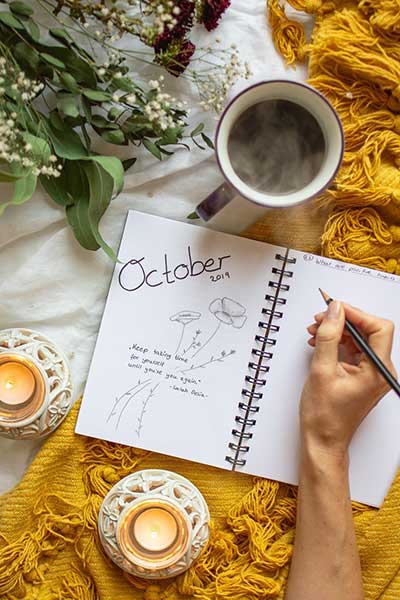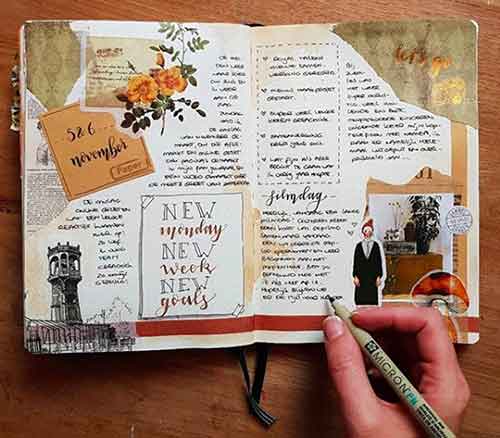If keeping a journal is one of your New Year’s resolutions, we applaud you. There is lots of literature which suggests that journaling can change one’s life for the better. Not only does keeping a journal give you a chance to take stock routinely, but it also has the power to hold you accountable to your goals, help you kick habits that need to go and can be a wonderful outlet for creativity.
Before you make a ‘Dear Diary…’ joke, take a minute to consider what journaling is and how it can be different from writing diary entries. Journaling can be whatever you want it to be. It can be a way to record events chronologically; a space to jot down ideas and explore creative cues; a safe zone for exploring your deepest thoughts through words, drawings, collages and images, a record of things you are grateful for, or all of the above.
Journaling sounds really easy, but it can be quite hard. We’re all too good at skimming on the surface as we navigate through life, and the fact that journaling requires us to delve deep into our thoughts, insecurities, wishes and dreams is enough to scare us away on most days. Here are 5 tips that make keeping a journal easy…
Define your ‘why’
Why do you want to keep a journal? Is it because you feel you need to unload the goings-on of your mind on paper? Or do you need it to be a record of your progress on goals that mean a lot to you? It is important to define your ‘why’ as it becomes the underlying purpose behind your journaling experience. It is said that those coping with mental illness benefit greatly from maintaining a journal because they are able to understand their thought processes behind certain actions and reactions. Some people also swear by journaling as a fun pass-time, where they bring to life images, stories and everything from their imaginations and translate them onto paper where they become real.
Keep the journal with you at all times
We are not suggesting journaling every day or at a specific time. But keeping your journal at hand means you have it with you when inspiration strikes, or if you really need to get something off your chest. This way you don’t have to wait to get home before you can put it down on paper. You will be able to preserve the raw realness of the journal entry.
Mix it up
Your journal doesn’t have to be a litany of what you did and thought in the day. Instead it can be a mix of bullet journaling, short stories, little writeups done with the help of writing cues, drawings and paintings, clippings from magazines or newspapers, photographs of nature or of your loved ones. Do not restrict your journal to only one type of entry. Mix it up, and you’ll see that journaling is fun and refreshing, as opposed to a chore.
Don’t make journaling a habit
Yes, we do encourage journaling regularly. This helps you keep a log of your ideas and reasoning. But creating a habit out of it is unnecessary. The urge to make a journal entry should come from within. Journaling should be a response to a source of inspiration instead of just being a daily task that you tick off your to-do list before the end of the day. Let your journal be an outlet where you can pour yourself out, instead of a space where you need to squeeze out an entry.
Personalise your journal
When it comes to journaling, it should be an extremely personal experience. This book that you are expressing yourself in is all about you. And for that reason, we recommend creating quirky layouts, using different coloured pens and pencils, using stickers or polaroids, doing little splashes of typography, drawing comics and doodles and creating your own fonts in your entries. This will essentially be the ‘style’ of your journal. Use these touches repeatedly throughout your journal in order to make it feel completely like your own. This will make the overall journaling experience entertaining and enriching.



